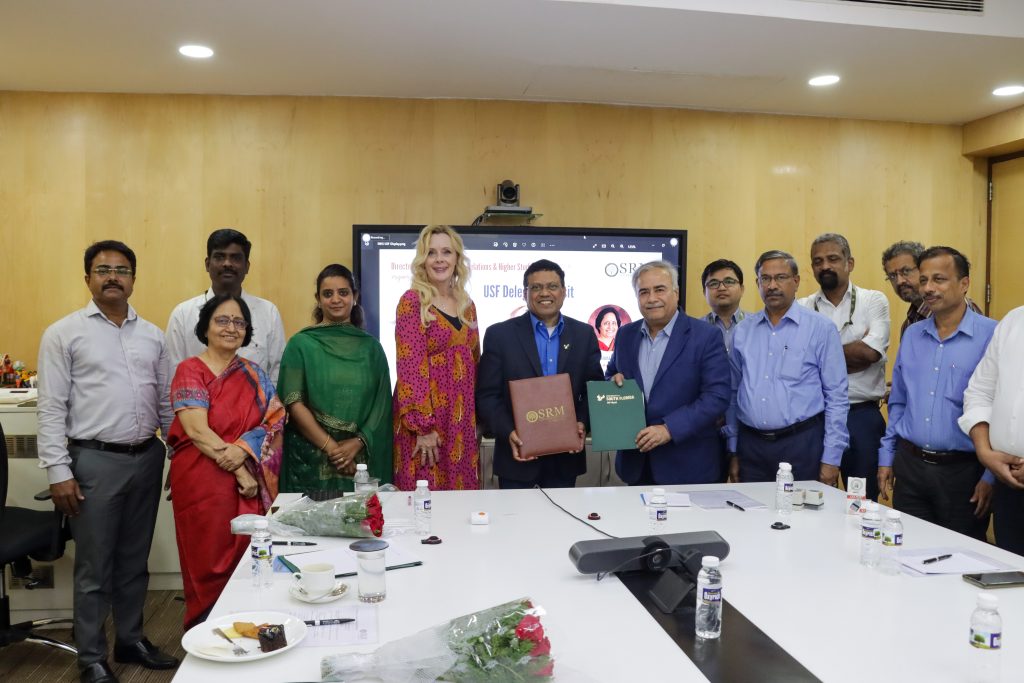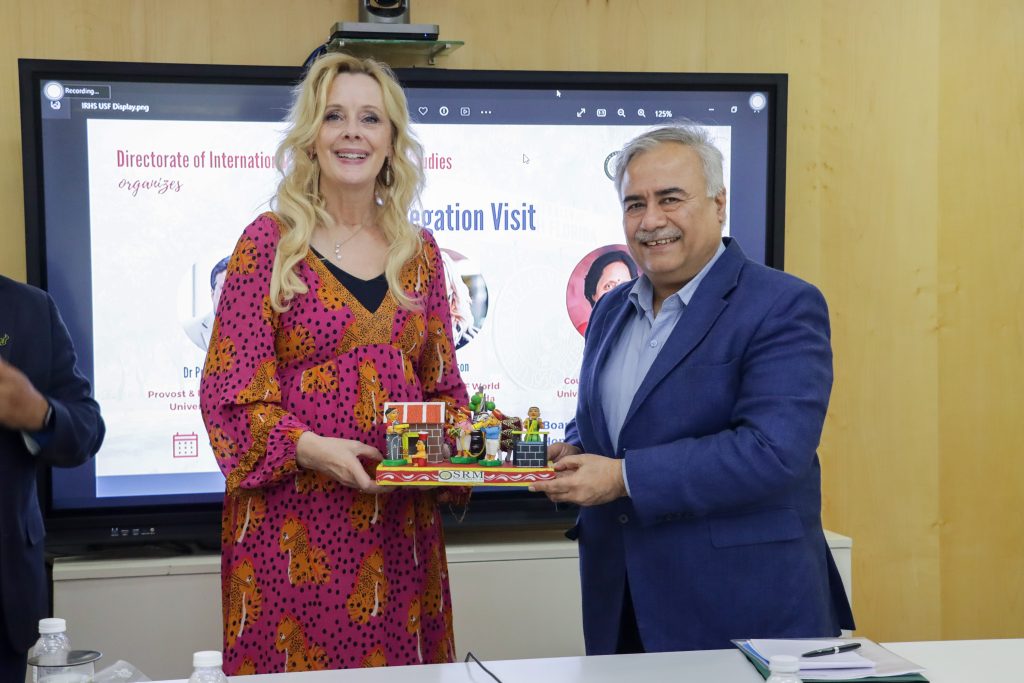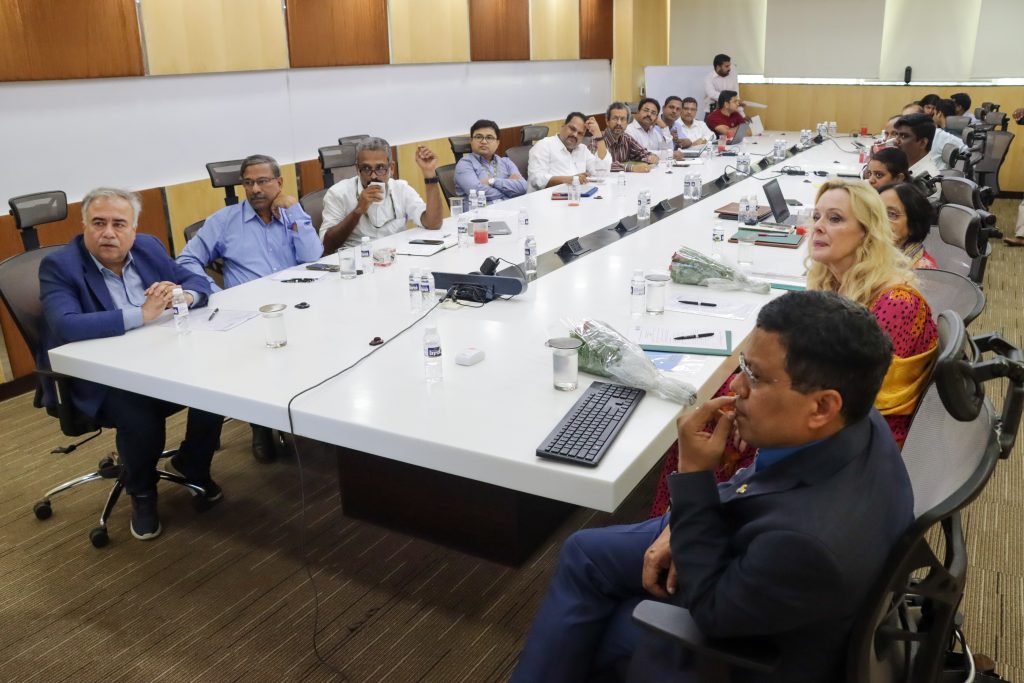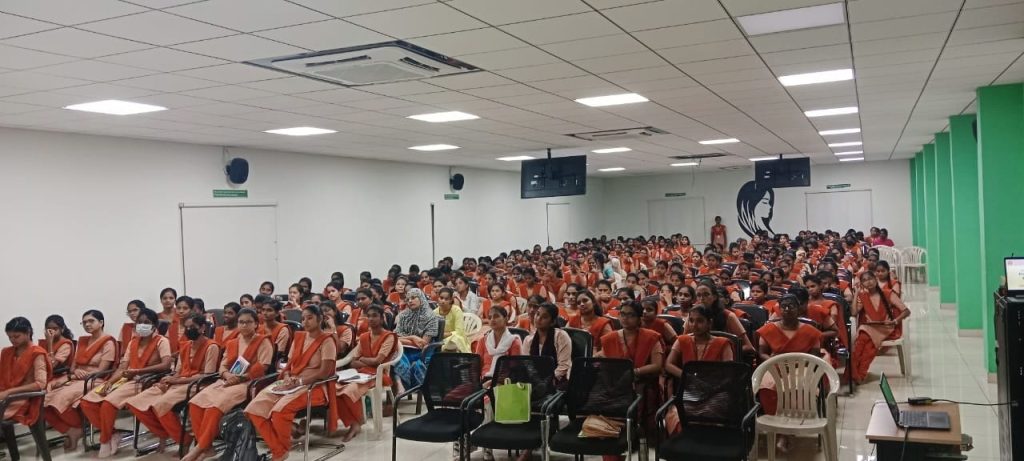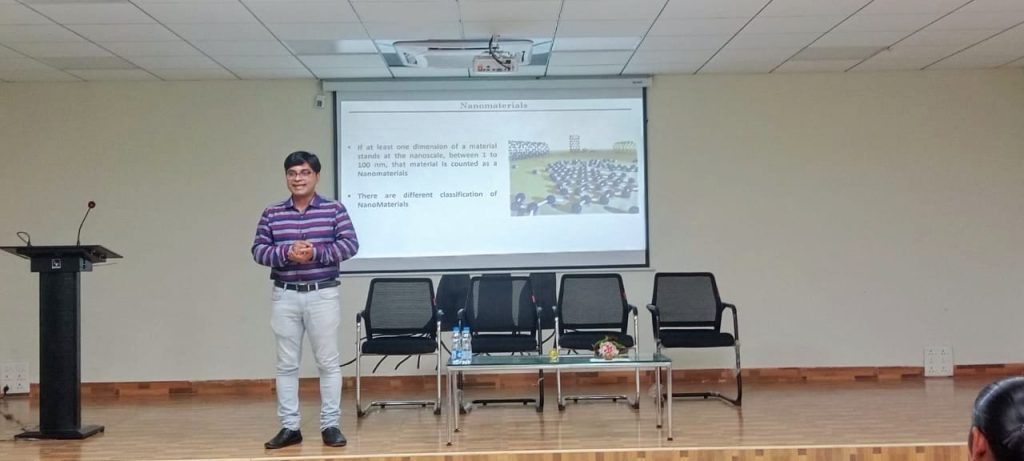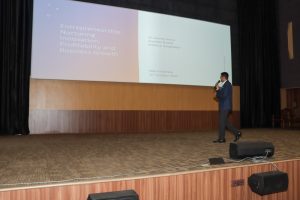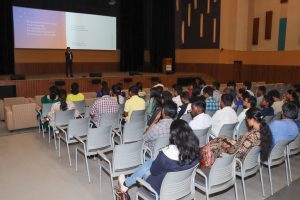SRM University-AP Signed MOU with University of South Florida
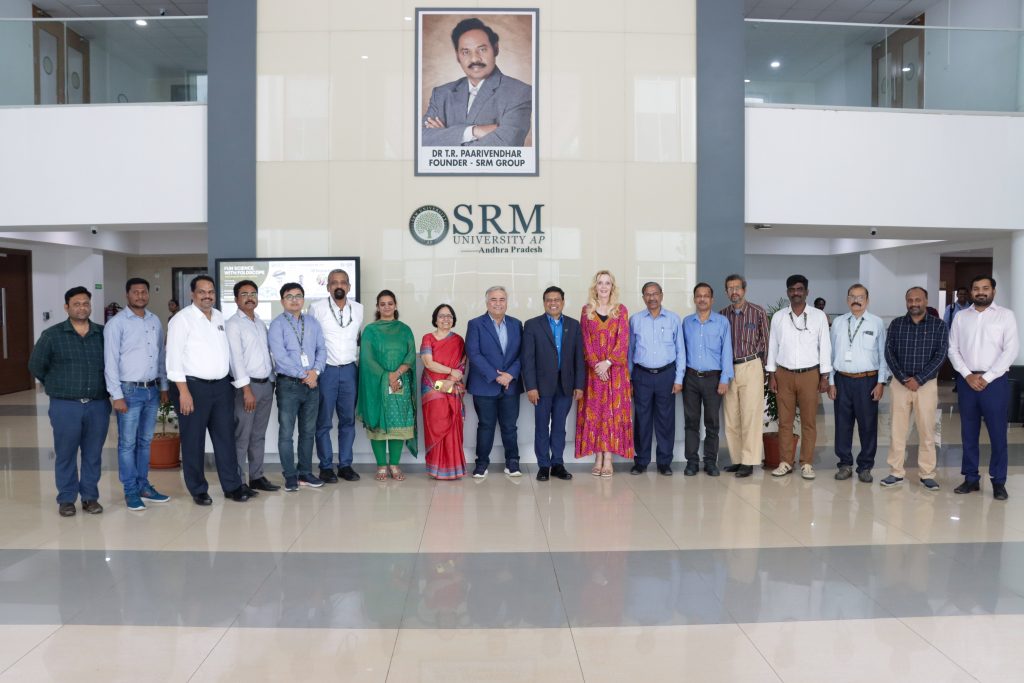
SRM University-AP, Andhra Pradesh, takes a momentous step towards enhancing its global presence and fostering academic collaboration by signing a Memorandum of Understanding (MOU) with the University of South Florida (USF). This historic event took place in the esteemed presence of Prof. Manoj K Arora, Vice Chancellor, SRM University-AP, Dr Prashant Mohapatra, Provost & Executive Vice President of the University of South Florida, along with Dr Kiki Caruson, Vice President, USF.
The MOU hailed as an “umbrella agreement” represents a comprehensive and strategic partnership to promote collaborative research, student exchanges, faculty interactions, and cultural engagement between the two institutions. This MOU will pave the way for academic exchanges, joint research initiatives, and collaborative projects that will enrich the educational experience for students and faculty at both institutions. The partnership seeks to facilitate cultural exchanges, allowing students to gain a broader understanding of global perspectives and fostering an atmosphere of inclusivity and diversity. SRM University-AP students will have the opportunity to experience a truly global education by participating in programs and activities hosted by the University of South Florida. Joint research projects will allow both institutions to tackle complex global challenges and significantly contribute to their respective academic fields.
Dr Prashant Mohapatra emphasised the importance of international collaborations in higher education, stating, “This partnership allows us to combine our strengths and resources for the benefit of our students and faculty. We look forward to the notable opportunities that lie ahead and remark on the potential for impactful research collaborations; by bringing together our expertise and knowledge, we can address global challenges more effectively. This MOU is a testament to our shared commitment to academic excellence.”
Prof. Arora, also expressed his enthusiasm for the collaboration, saying, “This MOU signifies the beginning of a new era in our journey towards global academic excellence. We are thrilled to join hands with the USF, a renowned institution with a strong commitment to innovation and research.” As the academic world evolves, SRM University-AP remains dedicated to providing its students with the best possible opportunities and experiences. The MOU with the University of South Florida is a significant stride in this direction, reinforcing the institution’s commitment to global learning and a brighter future.
Best Paper Award: Accorded to Dr Supen Kumar at MRAE 2023
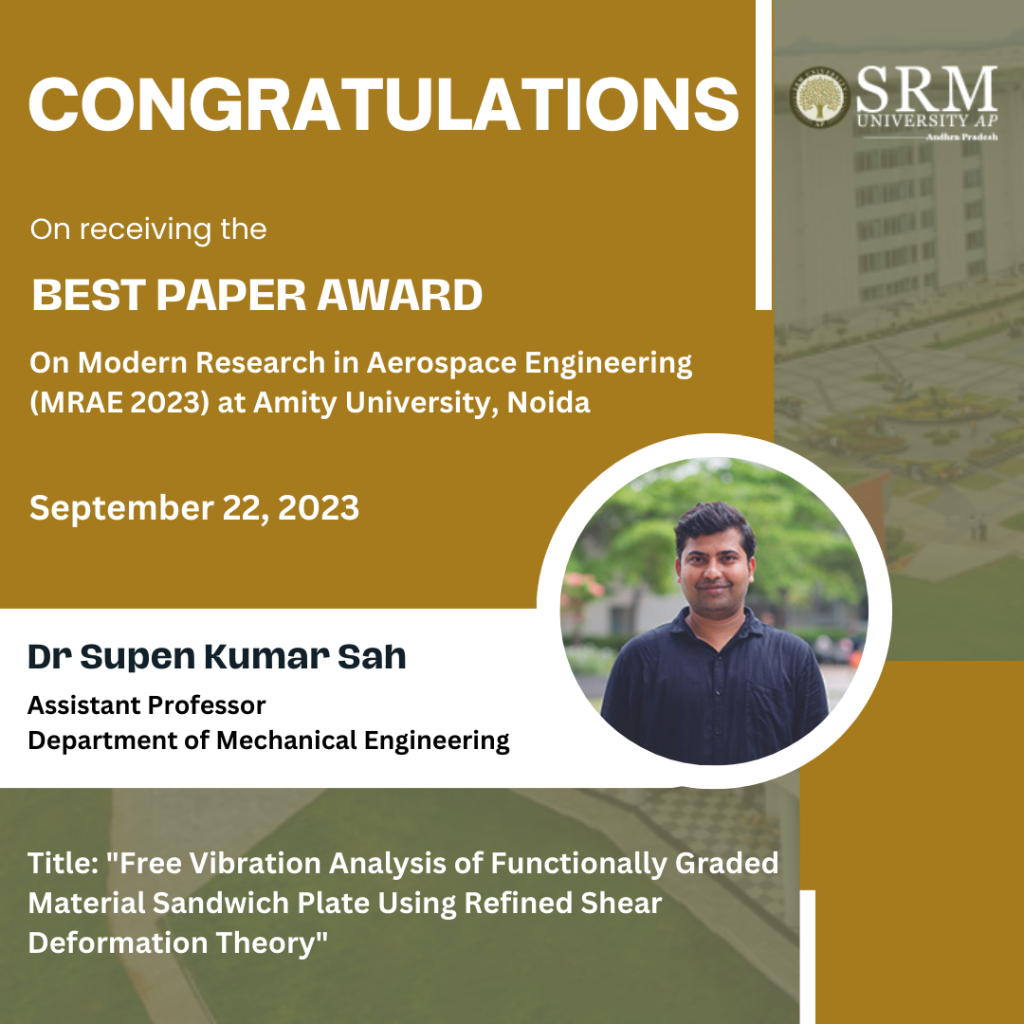
The Department of Mechanical Engineering is delighted to share that Dr Supen Kumar Sah, Assistant Professor, Department of Mechanical Engineering, has received the best paper award for his paper titled “Free Vibration Analysis of Functionally Graded Material Sandwich Plate Using Refined Shear Deformation Theory” in the 2nd International Conference on Modern Research in Aerospace Engineering (MRAE 2023). Dr Supen collaborated with Saloni Malviya of VIT, Bhopal, for the research paper. The paper explores the intricate dynamics of functionally graded material sandwich plates, employing a refined deformation theory. Dr Sah’s exceptional work has not only contributed to the scientific community but has also demonstrated his dedication and passion for advancing knowledge in the field of materials science and engineering.
Abstract
In the present study, free vibration analysis of a functionally graded material sandwich plate has been carried out using refined shear deformation theory. The shear correction factor is not needed since the parabolic variation of shear strain through the thickness is in such a way that shear stresses vanish on the plate surfaces. Hamilton’s principle is used for the derivation of the equation of motion for the theory. Additionally, Navier’s solution is used to obtain the eigenvalue equation for the sandwich plate. The three variants of sandwich plate are chosen for the analysis. To carry out the free vibration analysis three different types of FGM sandwich plate models namely 1-1-1, 1-2-1, and 2-2-1 have been considered. A power law defines the volume fraction index and the material properties of the individual layers of the sandwich plate. Lastly, the impact of parameters such as volume fraction, aspect ratio, and length-to-width ratio on frequency parameters is investigated.
Future Research Plans
• Modelling and Analysis of porous uni and multi-directional Functionally Graded Material (FGM) plates to obtain the impact of porosity distributions over structural responses.
• Analytical and finite Element Solutions for static and dynamic response of FGM sandwich plates employing non-polynomial shear deformation theories under elastic foundation.


- Published in Departmental News, Faculty Achievements, Mechanical Engineering NEWS, News, Research News
Inspiring the Next Generation: A Guest Lecture on Advances in Nanotechnology
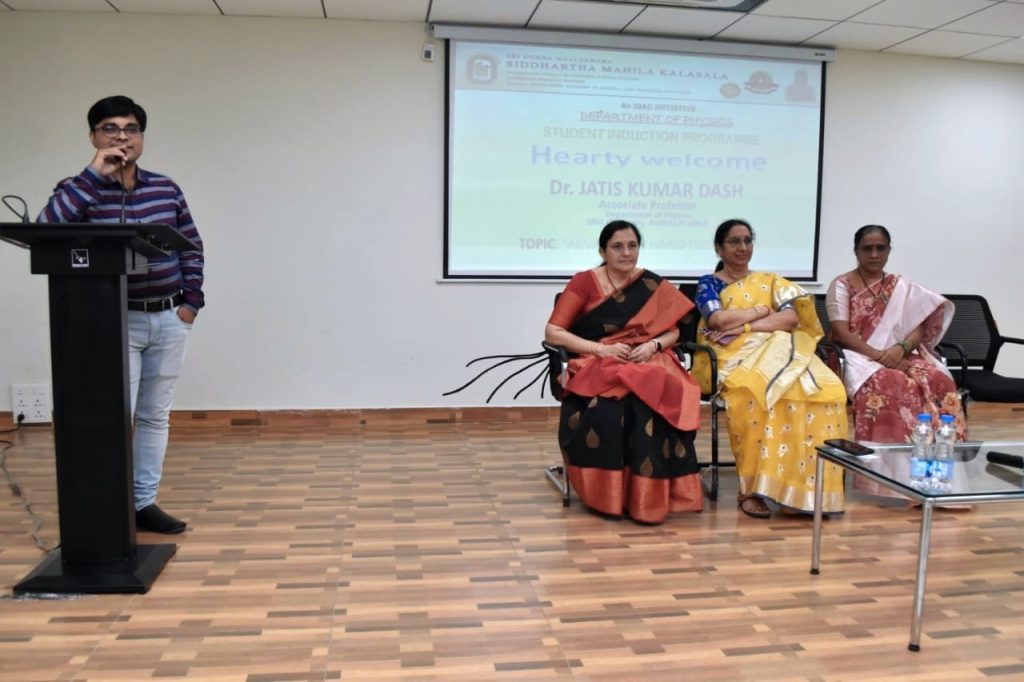
Dr Jatis Kumar Dash, Associate Professor in Physics at SRM University-AP, delivered an invited lecture on Advances in Nanotechnology at Sri Durga Malleswara Siddhartha Mahila Kalasala, Vijayawada on September 30, 2023.
During the lecture, the students were actively engaged and asked insightful questions that demonstrated their keen interest in how nanotechnology can address global challenges in fields like energy and security. By the end of the lecture, many students expressed their interest in pursuing research careers and visiting the varsity to conduct short internship programmes under the guidance of the faculty members in the Department of Physics and explore the advanced laboratories. Dr Jatis was happy to have sparked the students’ interest in nanomaterials and devices.
SRM University-AP is committed to providing students with opportunities to learn about cutting-edge technologies and develop the skills they need to succeed in their careers. The guest lecture on Advances in Nanotechnology is just one example of how the university is working to prepare students for the future. In the spirit of innovation and nurturing the dreams of these young minds the varsity extended an open invitation to the students of Sri Durga Malleswara Siddhartha Mahila Kalasala to explore our state-of-the-art laboratories and engage in research opportunities. The students can experience the frontiers of science and directly take part in the current ongoing research works.
- Published in Departmental News, News, Physics News
Dr Gaurav Arora on the Power of Entrepreneurship
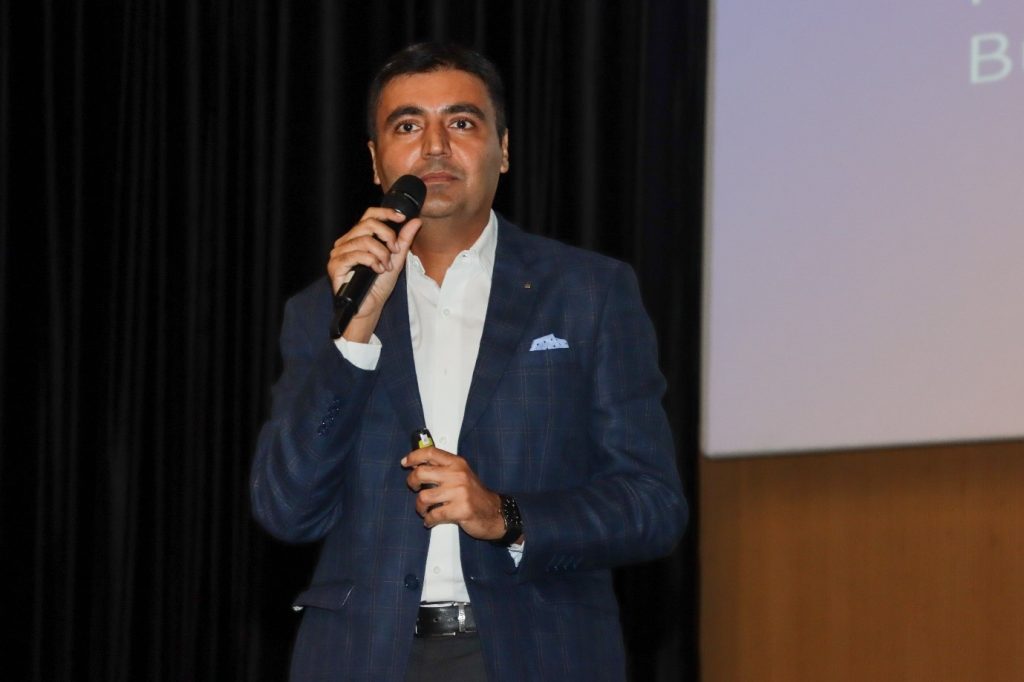
Paari School of Business is committed to nurturing the entrepreneurial spirit among its students. The school had invited Dr Gaurav Arora, Global Entrepreneur at Enhance (Luxury Hospitality and Tourism Representation), to deliver an inspiring lecture on October 11, 2023. The lecture titled “Entrepreneurship: Nurturing Innovation, Profitability, and Business Growth” encapsulated key insights for budding entrepreneurs.
Dr Arora dispelled the notion that entrepreneurship is an exclusive venture, asserting that anyone can dare to dream and embark on this journey. He highlighted the importance of enthusiasm, initiative, and teamwork in entrepreneurial success. The lecture showcased the power of keywords such as passion, motivation, and reliability, which serve as the foundation for a successful entrepreneurial career.
He shared valuable experiences in navigating challenges, including the digital transformation his company undertook during the COVID-19 pandemic. Dr Arora emphasised self-reliance and the significance of taking initiative to achieve one’s goals. The lecture concluded with a simple yet effective approach to success: Dream, Plan, and Execute. Dr Arora also shared an inspiring success story, “Zerodha” India’s leading stockbroker.
The lecture provided a wealth of insights, encouraging students to embrace creativity, take calculated risks, and maintain a clear vision for their entrepreneurial endeavours.
- Published in Departmental News, News, Paari Current Happenings


